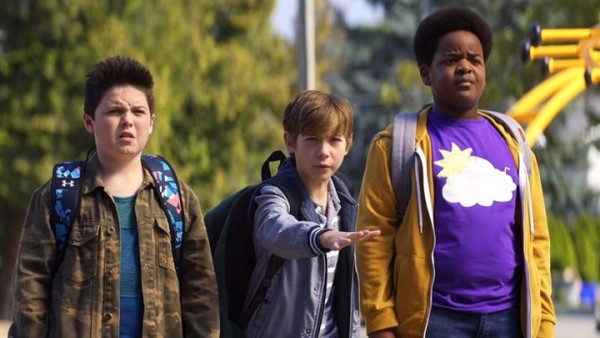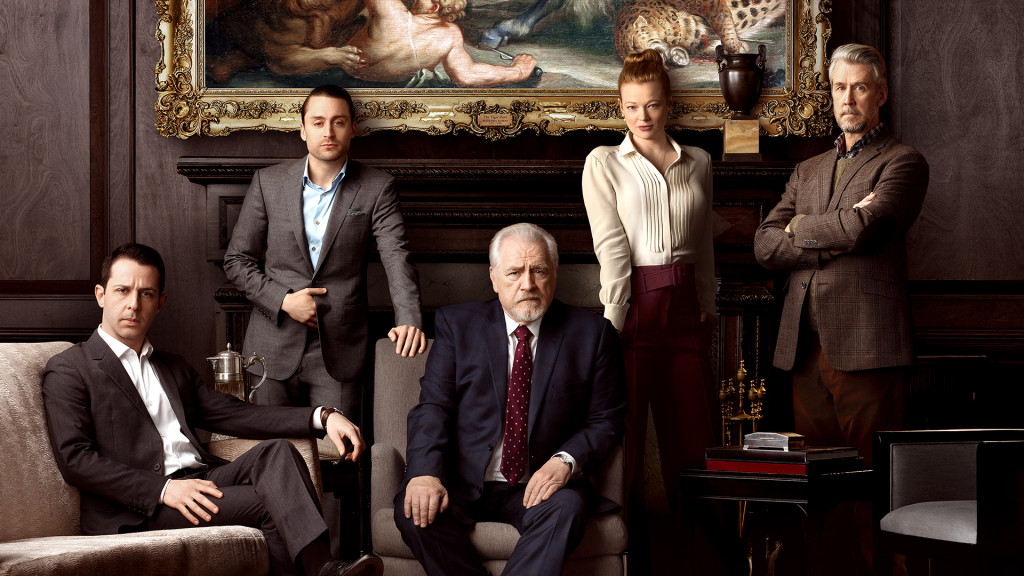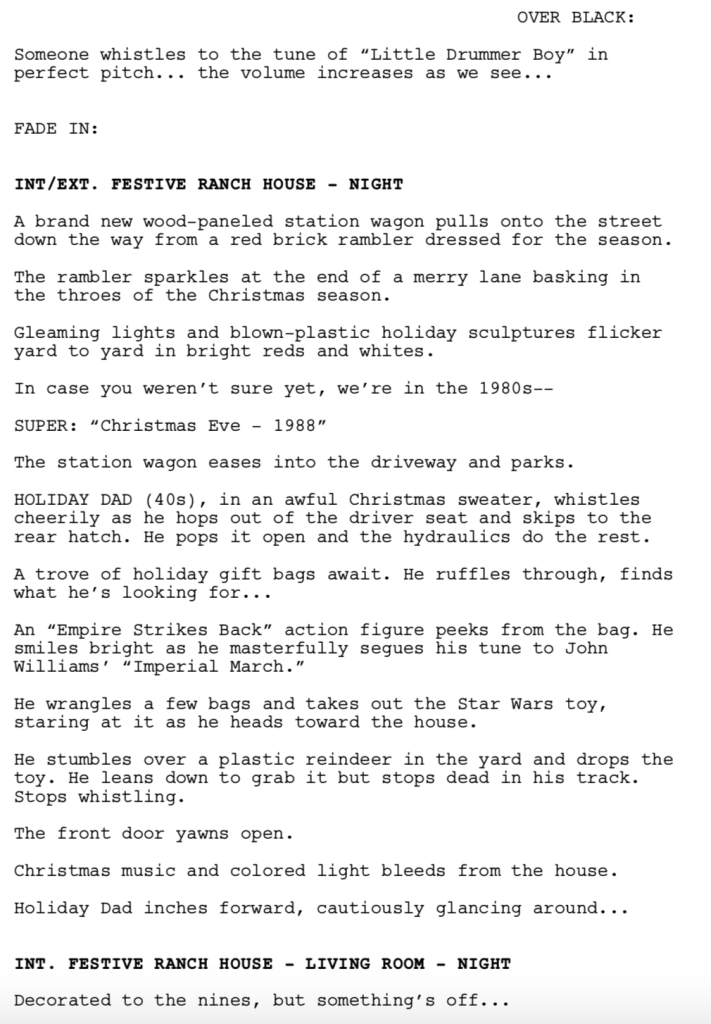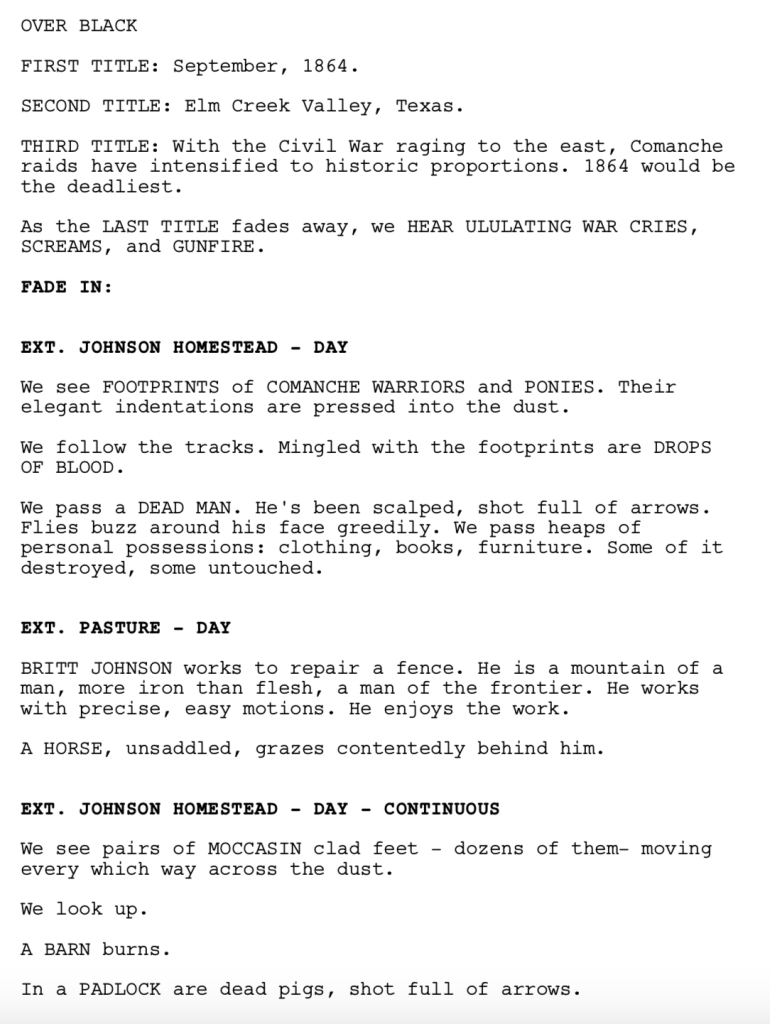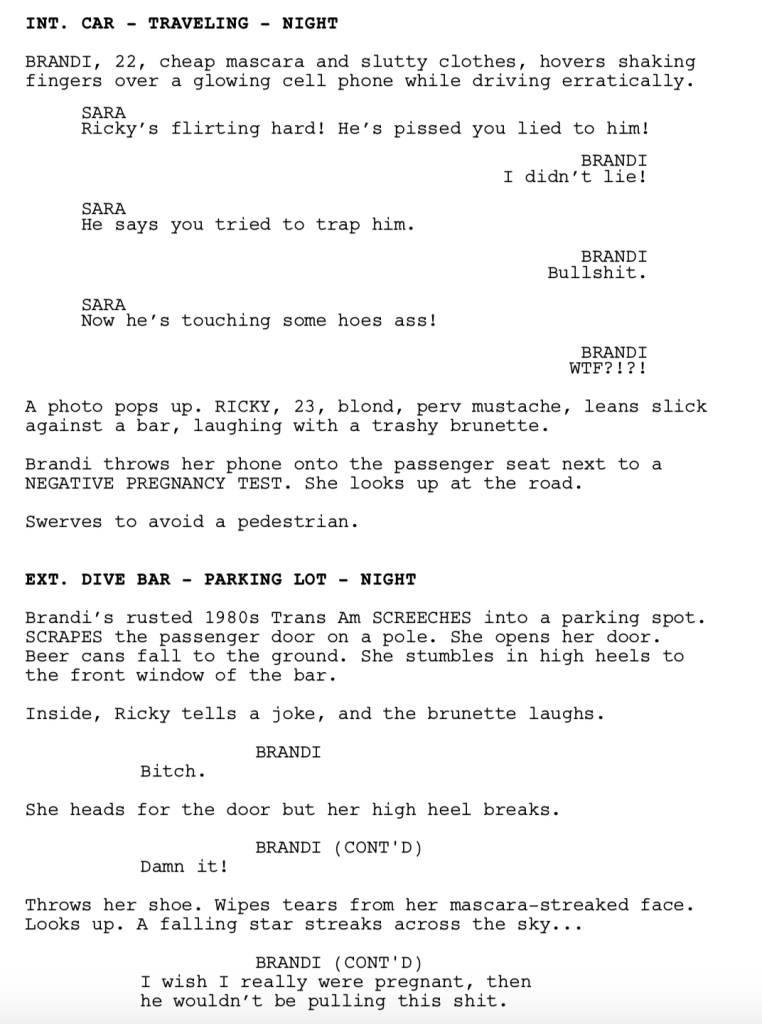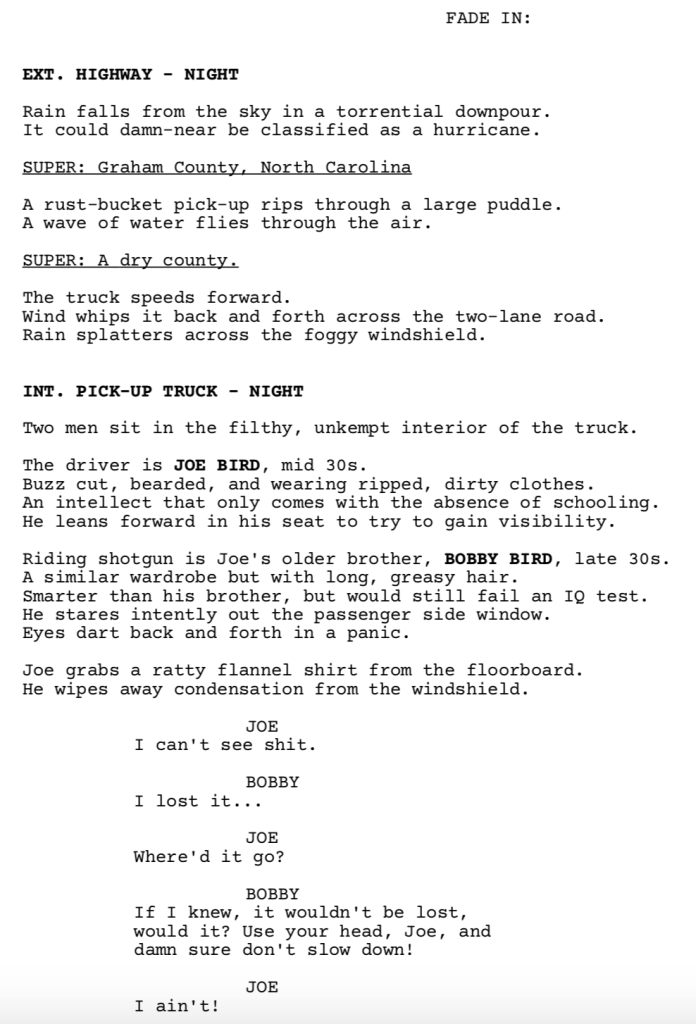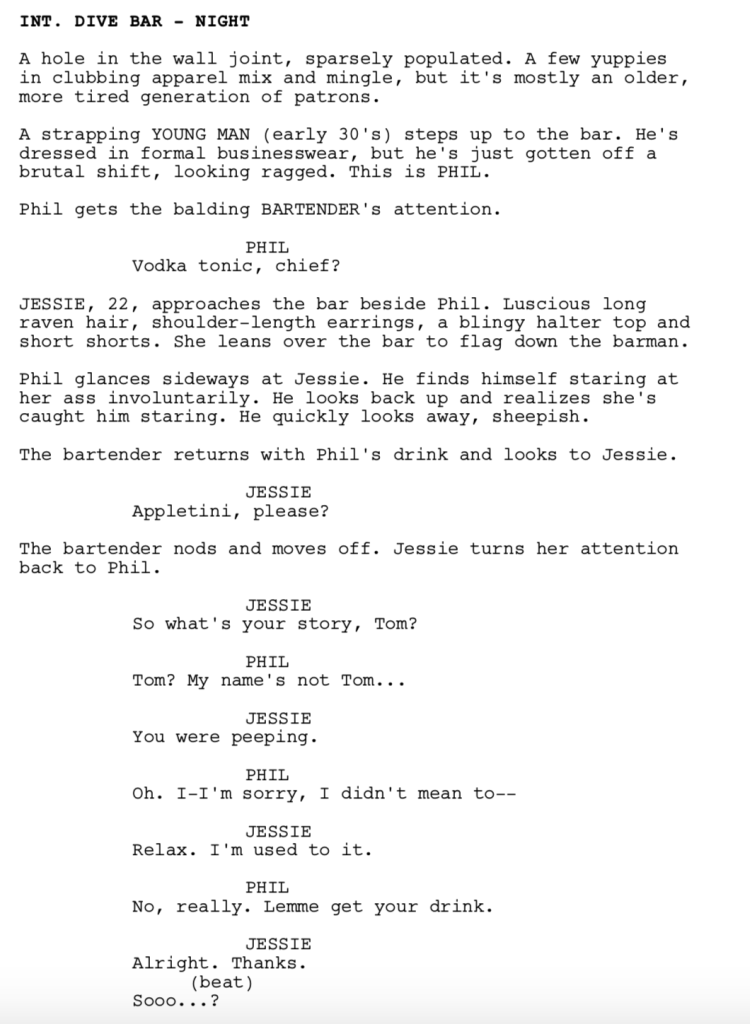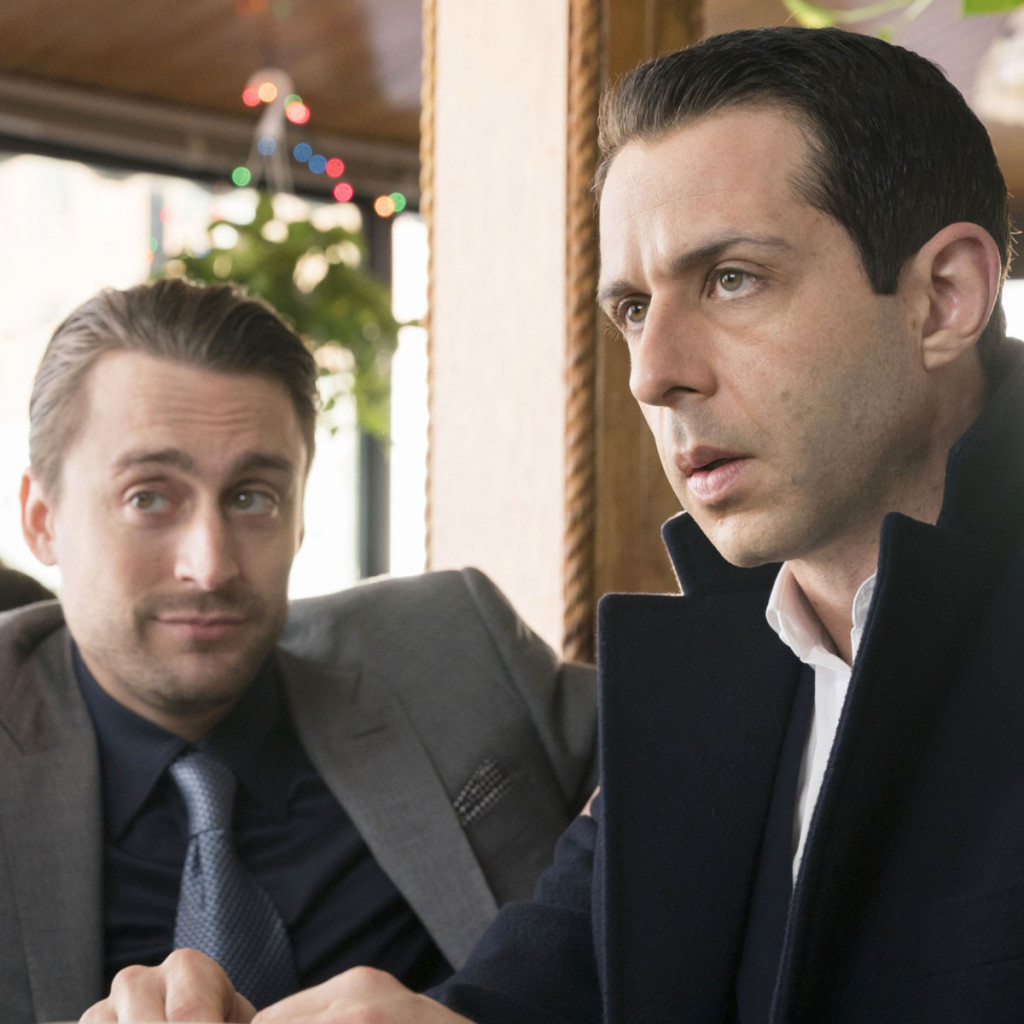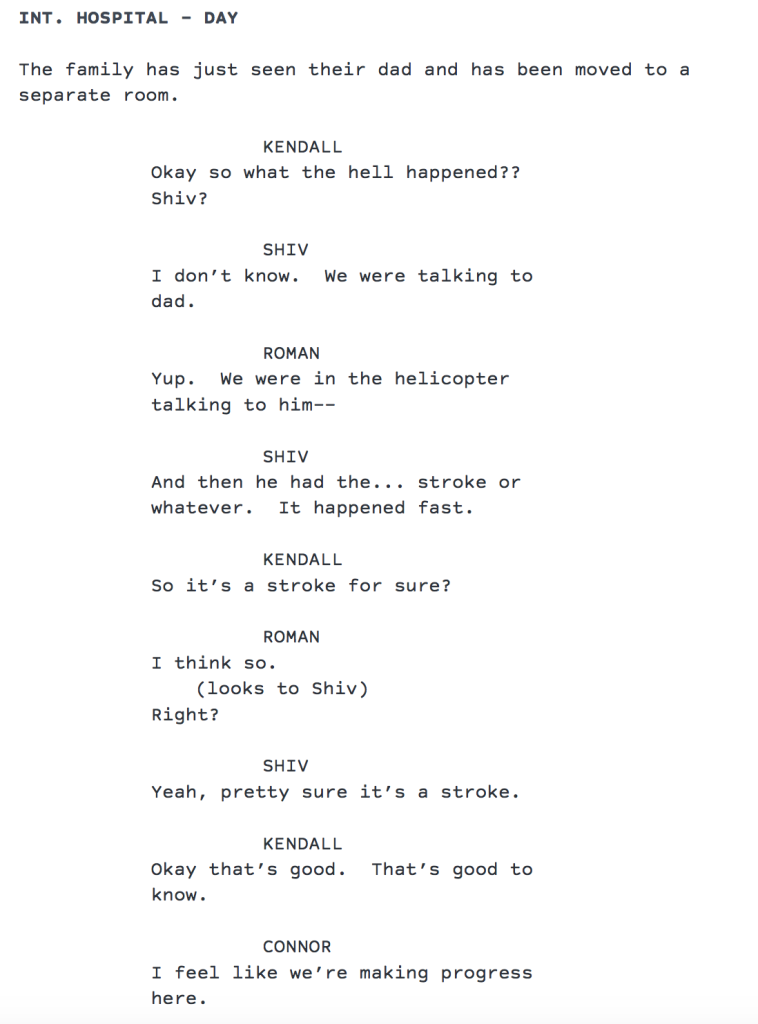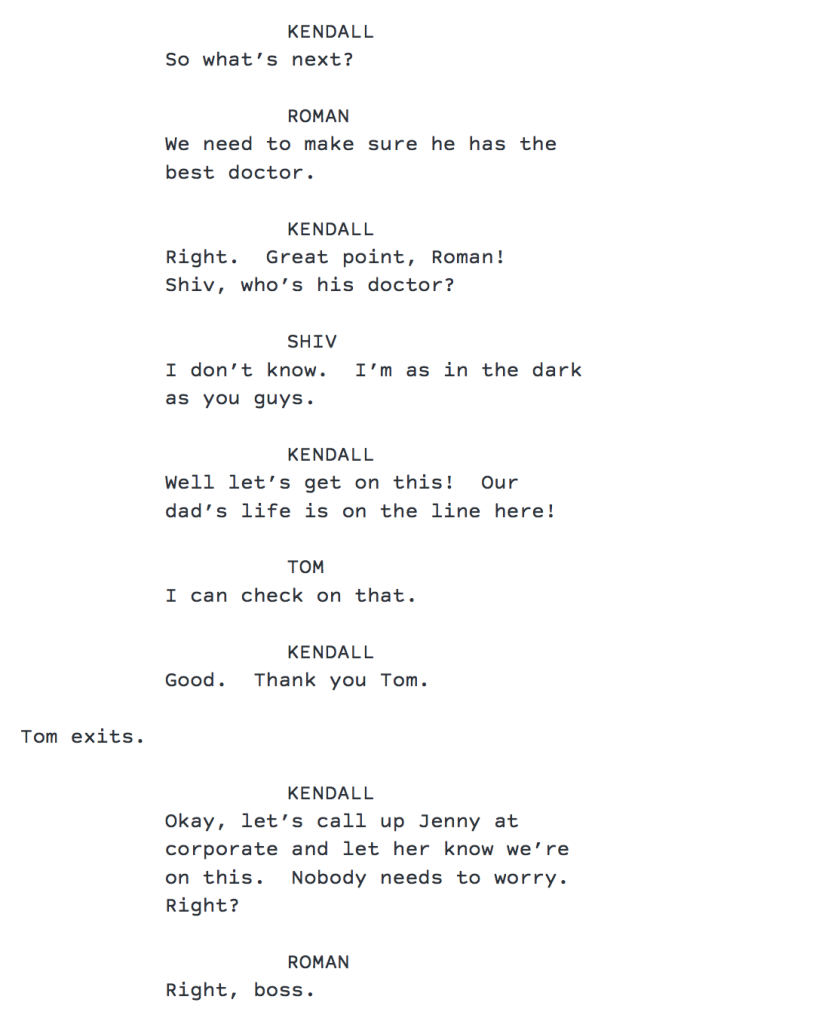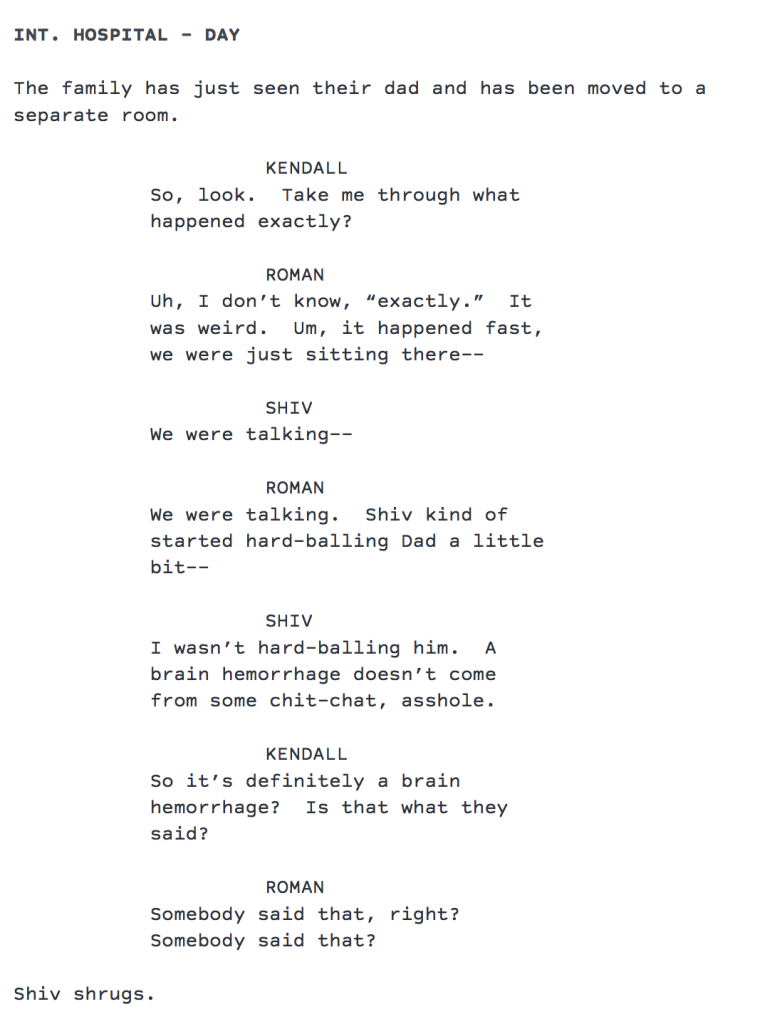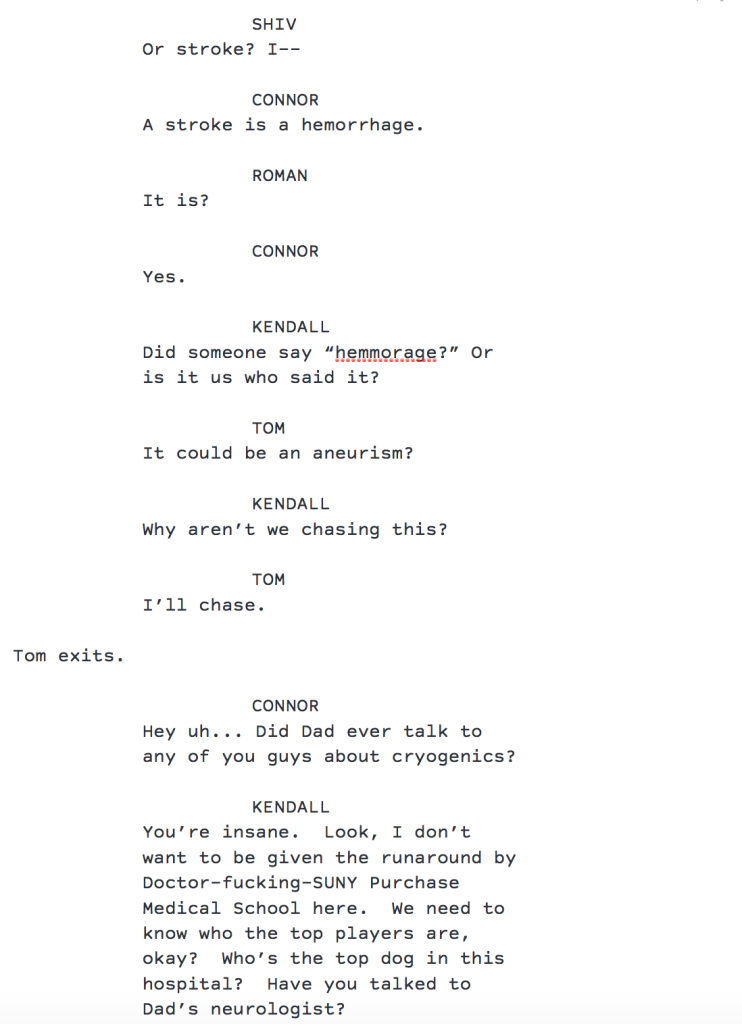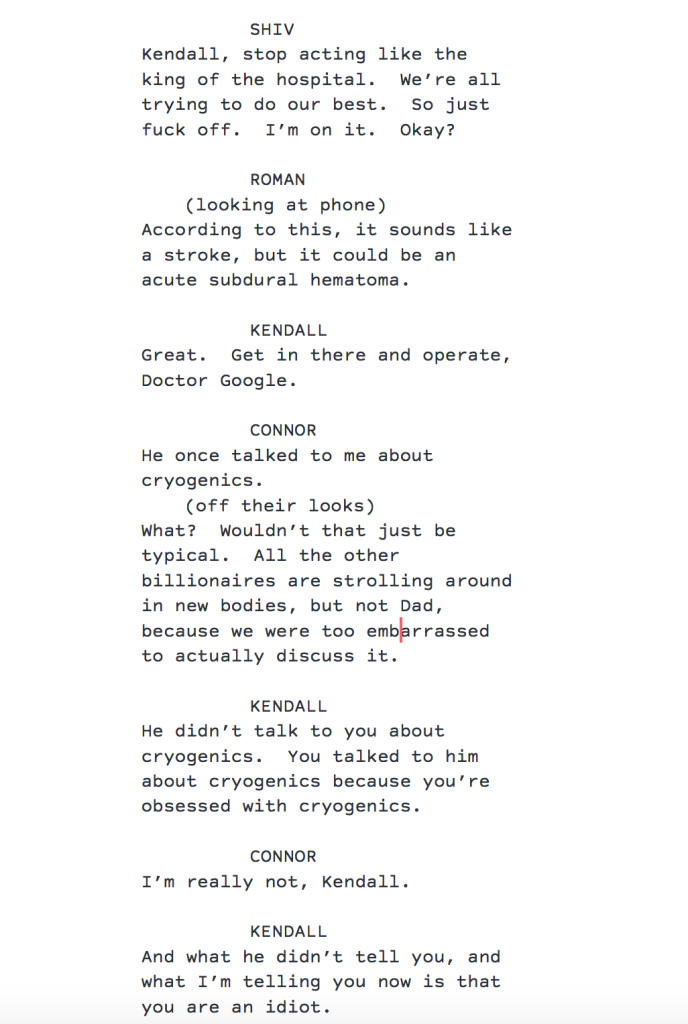Genre: Sorta Horror/Teen
Premise: A high school begins to fall apart when its students start spontaneously combusting.
About: This project is based on a recent novel written by Aaron Starmer. It will star Katherine Langford from 13 Reasons Why. Brian Duffield not only adapted the screenplay but is also making his directorial debut. The movie was shot in January of last year so I’m not sure why it hasn’t come out yet. Spontaneous is one of the first films to come from AwesomenessTV, which is one of the biggest channels on Youtube.
Writer: Brian Duffield (based on the novel by Aaron Starmer
Details: 110 pages (First Draft)
I like going into Brian Duffield scripts as naked as possible. Not physically of course. But I don’t want to know anything. One of the great things about Duffield scripts is that crazy things can happen at any moment and I don’t want to spoil them before they happen.
With that said, I heard through the grape vine that this was an adaptation, and that definitely colored my reading experience. Duffield has worked almost exclusively on original material, which has been great because his mind doesn’t work like anyone else’s. So if he’s working off of someone else’s idea, he has to reign in some of that famous creativity.
And as we’re about to find out, that’s not the best way for him to work.
Spontaneous is Thirteen Reasons Why meets John Hughes meets Warm Bodies. 17 year old Mara is sitting in Pre-Calc when the girl in front of her, Katelyn, explodes. At first, everybody assumes it’s a school shooting so they run around the hallways like chickens with their heads cut off. But eventually they learn that Katelyn wasn’t shot. She spontaneously combusted. Or exploded.
While Mara and her best friend, Tess, struggle to make sense of what happened, fellow senior and kinda weirdo, Dylan, crashes the party to say hi. Dylan, it turns out, has been in love with Mara from afar all throughout high school. Lucky for Dylan, Mara’s kind of liked him, too. So the two start dating. Which should be a happy time. Until another senior, a gay football player, spontaneously explodes.
Now it’s an epidemic. Which means the media and the authorities descend on this small town, E.T.’ing it so no one can come in or out. They start doing all these experiments on the kids, until they eventually develop a pill that keeps people from spontaneously exploding. And so it’s BACK TO SCHOOL for everyone, where it seems like everything is normal again. That is until a mass of spontaneous explosions occur (spoiler) including Dylan!
With the love of her life gone, Mara suspects that she’s the curse that killed everyone. I mean, Katelyn was right in front of her when she exploded. Dylan was around her all the time and he exploded. So it must be true. But eventually Mara philosophizes that life sucks no matter what and that all you can do is your best before you die. The end.
Hmmm…
I don’t know who to direct my disappointment towards here. While Duffield wrote the script, everything is based on the book. And, as the saying goes, you’re only as good as your source material.
Look, the good news is that this is an original premise. No zombies. No vampires. No aliens. No monsters. The spontaneous combustion premise is unique.
The problem is, the author didn’t know what to do with that premise. For starters, it’s a terrible premise for building tension. At least when you have zombies, you can create suspenseful situations as those zombies slowly move in on our trapped characters. But with spontaneous combustion, it’s random. There’s no way to build tension with randomness. You’re sitting around for 25 pages of dialogue and then you hear how a new person just blew up. I’m not sure there’s any way to fix that problem.
Nor is the structure here story-friendly. It’s a car ride where nobody tells us where the destination is. So we’re not even the annoying kids in the back screaming, “Are we there yet?” We’re the annoying adults screaming, “Where are we going?”
Theoretically, this sets the stage for what Duffield does best. He can plant two characters in a room and let them dialogue away. Indeed, the dialogue here feels effortless and flowing. The problem is, because there’s no plot, and therefore nobody’s trying to get anywhere in these scenes, they start to get tiring. And repetitive.
And this is why it’s so important to figure out your structure ahead of time. Because if you repeatedly drop characters into scenes where they don’t want anything other than to talk to each other, the story’s never going to feel like it’s advancing.
When you’re writing a story like this, you have two directions you can go in. Direction 1 is to create a mystery behind the problem (spontaneous combustions) that the characters are trying to solve. This gives your heroes a goal and therefore a purposeful journey. “Why are people exploding,” Mara can say. “Let’s investigate.” They don’t do that here. Scientists come in and try to figure things out. But our heroes spend that time sitting around waiting. The other option is to use your story as a metaphor for something. At least that way, we get the feeling that there was a purpose to the experience. If this teaches us a powerful lesson about life, it can work.
But this didn’t do that either (or, at least, this draft didn’t). And I think it’s a source material problem because I went to Amazon afterwards and I was seeing the same complaints in the reviews. The author had his characters talk the whole time while a bunch of people blew up without explanation and in the end, capped it off with, “that’s the randomness of life.” I think I speak for writers everywhere when I say that if your theme is, “randomness of life, bro,” you probably haven’t dug deep enough.
I’ll say it again: you’re only as good as your source material. You’re never going to teach Danny DeVito to be Roger Federer. Then again, it’s important to note that this is a first draft, that Duffield likely added more structure in the subsequent drafts. But for this to have worked, somebody would’ve needed to come up with a radical idea on how to make this concept movie-friendly. I hope that’s what Duffield did. Cause if this movie does well, he’ll get to make some of his own scripts. And that’s what I’d really like to see.
[ ] What the hell did I just read?
[x] wasn’t for me
[ ] worth the read
[ ] impressive
[ ] genius
What I learned: It’s dangerous to give characters other than your heroes the active storyline. In other words, the goal here is to find out why these spontaneous combustions are happening. But that goal is given to the FBI and scientists while our heroes sit around and wait for them to finish. You want your heroes to be involved in the ultimate goal of the screenplay. 99 times out of 100, that results in a better script.
Don’t be jealous.
I cooked a pizza.
ALL. BY. MYSELF.
Yup. We’re talking FROM SCRATCH.
Many a moon ago, I gave up on being a chef. I couldn’t even get scrambled eggs right. And then I found Bon Appetit’s Youtube Channel. Cue chorus of angels singing. I’ve never come across a Youtube channel that’s had more likable personalities than Bon Appetit. Brad, Claire, Molly, Carla. Every single person on that channel manages to be knowledgeable, humble, and likable (let’s put a bookmark in “likable” as that’s going to be big theme in this Mish Mash). Since I’ve found this channel, I’ve been a non-stop recipe binging beast, making things that I did not know I was capable of. If you’ve ever been scared to cook, I suggest this channel. They have figured out how to make cooking unintimidating.
Speaking of, I have identified Bon Appetit’s videos as a new genre called “Learnertainment.” It’s a Youtube-specific type of entertainment that offers genuine instruction in an entertaining manner. If you’re a gym rat, why watch some boring bench press video when you can watch the Buff Dudes do it? It’s another example of the fractionation of media. Why pay $15 to go see a bunch of kids swearing for two hours when you can get your entertainment fix in watching five Youtube videos?
The reason I keep drilling this into your head is to remind you just how good a script needs to be in order to drag people away from all these other forms of entertainment, which as we’re seeing, are multiplying by the day! Good Boys is getting some good press and while I’ll admit launching an original comedy without any names to the top of the box office isn’t easy (you try it!), it’s still a 20 million dollar opening. In a time where nobody blinks at a 100 million dollar opening, do we care about 20 million anymore? I do think this means R-rated comedy specs will be hot for the next six months, though. So if you’ve got the perfect R rated comedy, time to start writing!
As for the rest of the week’s opening films, there were, unfortunately, no breakouts. I remember downloading a sample of the novel, “Where’d You Go, Bernadette,” when it came out. It was an odd book where everything was written in e-mails and texts and social media. As a result, it wasn’t easy to get into. So the more I read, the more I answered the title’s question with, “I don’t care.” Needless to say, I’m not surprised it tanked. And what is Richard Linklater doing directing this movie? Does he have a variable interest mortgage rate that kicked in recently?
Angry Birds and 47 Meters also opened to about 10 million each. I thought the first Angry Birds was surprisingly funny. The premise of this bird dealing with anger issues was explored well. But I’m not sure this franchise was meant for longevity. 47 Meters – hey, shark movies sell. We’ve said it here a million times. I’m guessing they wanted more than a 10 million dollar opening. But the marketing didn’t give anyone a “must see” vibe. Finally, there was Blinded by the Light, which feels like an exec from the year 1997 was accidentally sent forward in time to make this deal. Blinded by the Light was purchased for 15 million dollars after it debuted at Sundance. 15 MILLION! It is a movie about a Pakistani boy in the 1980s who learns to deal with life through Bruce Springsteen music. Uhhh, I’m all for originality. But if there was such thing as too much originality, this concept would qualify. I hear this is good but it’s WAY too weird of a concept to have a 2000 theater release. A lot of people who work at the studios are so out of touch with anyone living inland. This is the kind of movie that only does well in New York and LA.
Moving on to more positive vibes…
I’m obsessed with the HBO show, Succession. I just did a dialogue piece about it Thursday. So if you haven’t checked that out, you have detention for the rest of the week.
The reason I’m obsessed with this show is that it features a bunch of patently unlikable people. And one of the things I always talk about on the site is that audiences need to root for your hero(es) in order for them to like your script. And the easiest way to get people to root for your hero is to make them likable. But the flip side of that is if you can make a movie or a show good with an unlikable lead (or leads), you are taken more seriously as a writer. These are the shows and movies that get all the awards and I think that’s why so many writers travel down this path, even though the path is dark and often leads to death.
The hierarchy goes something like this. Try to make your hero likable in some way. That way, we’re sure to root for them. If you can’t make them likable, make them relatable. Lester Burnham in American Beauty was a man going through a mid-life crisis who just wanted to find happiness. That was relatable to a lot of people. If you can’t make them relatable, make them interesting. Louis Bloom from Nightcrawler wasn’t very likable and definitely wasn’t relateable. But he was interesting. The problem is, each step down this ladder increases the difficulty of writing. So while we have a few breakout success stories of unlikable but interesting characters, most of the time, when writers write an unlikable hero, we don’t like the movie. Check out the 2002 movie, Rules of Attraction, to see the ultimate embodiment of this. We hated every character in that film. So of course we hated the movie.
And yet Succession somehow succeeds. It’s about a Rupert Murdoch like media tyrant who’s given birth to a bunch of selfish narcissistic a-holes who are so out of touch with reality that the only thing they know how to do is hurl insults at one another. I mean I just watched an episode where Logan (the Rupert Murdoch guy) hits a child. This is the kind of stuff that goes on in this show. Why do I keep coming back?
For starters, the characters are routinely funny. And one of my big rules for unlikable characters is that if you can make them funny, you stand a better chance at getting people to overlook their flaws. We all have a dark side in us and we tend to explore that through humor. So if you’ve got a character who spews out the same kind of inappropriate jokes as your best friend would, you’re going to like that person on some level. And in Succession, everybody has a cutting wit that makes every conversation the genesis for a potential gut-busting laugh.
This is why whenever I give notes to writers writing unlikable characters, I encourage them to give the characters a sense of humor. Writers, on the whole, tend to be frustrated people. And they often use their characters to unleash those frustrations. But if you’re not careful, it can come off very, “Bitter basement dweller ranting about the world.” Or “Pent up angry guy ready to shoot up a school.” People don’t relate to characters like that. The mere act of providing them an outlet through humor, however, can make them a lot more attractive.
Also, if you look closer, creator Jesse Armstrong does a good job counter-balancing the unlikable traits of his characters. The more unlikable the character is, the bigger the counter-balance. For example, Roman (Kieren Caulkin), is a terrible selfish person. So Armstrong makes him the funniest of the group. Roman is an unfiltered motormouth who just likes to have fun in an argument. Or Tom, Logan’s daughter’s fiance, isn’t the nicest guy. But his desperation to be liked by the family is endearing. Or Kendall, the successor son, is a cruel guy who wants to rule the world. But he’s also extremely vulnerable and, at his core, cares only about his father’s acceptance.
The point is, the writer is calculating how these characters will come off and counter-balancing that negativity with things we traditionally root for in people. A lot of beginner writers don’t know how to calculate un-likability. Or, if they do, don’t know all the positive traits available to them that would evolve the character into someone more likable. But I’ll be the first to admit, this is a dangerous game Jesse Armstrong is playing. He’s producing a Shakespeare play on a tightrope. The margin for error is so thin that the writing alone doesn’t guarantee success. You have to hope that all the actors understand the characters as well. Which is why you usually see these shows and movies crumble. Maybe that’s why I like it so much. It does so many things you’re “not supposed to do” and yet somehow thrives.
That’s all for today. However, I’m going to leave you with a tease for the September Newsletter. There’s been a lot of Star Wars news leaking lately and I have more opinions than a geriatric tauntaun at the Hoth senior rec center. I have to talk about it at some point. And with Disney’s D23 Expo happening this weekend, I expect there to be even more Star Wars news coming soon (might we get a second Rise of Skywalker trailer?). So it will be a Star Wars heavy September Newsletter. Seeya then!
First of all, congratulations are in order for Jason Gruich. Jason won the last Amateur Showdown and got the super-rare [x] impressive review from myself. I have a good relationship with Scott Stoops over at Good Fear. The two of us have extremely similar taste. So whenever I read something good, he’s one of the first people I call. I told him about Cop Cam, he read it, and he loved it. Since then, Jason has signed with Good Fear and they’re going to go wide with the script soon. They’re doing something really smart, which I hadn’t thought of. They’re marketing Jason as the next big “cop writer” in town. So even if nobody buys the script (as many of have pointed out, there are several other cop cam movies in development), Jason should get some assignment work in the cop/crime genre. I don’t know all the details. I’ll let Jason fill you in. But it just goes to show what can happen if you write a really sharp script.
Now let’s see if we can do it a second week in a row!
If you haven’t played Amateur Showdown before, it’s a cut throat single weekend screenplay tournament where the scripts have been vetted from a pile of hundreds to be featured here, for your entertainment. It’s up to you to read as much of each script as you can, then vote for your favorite in the comments section. Whoever receives the most votes by Sunday 11:59pm Pacific Time gets a review next Friday. If you’d like to submit your own script to compete in a future Amateur Showdown, send a PDF of your script to carsonreeves3@gmail.com with the title, genre, logline, and why you think your script should get a shot.
Title: The Carolers
Genre: Horror
Logline: After a savvy thirteen-year-old singer and her teenage cousin survive a brutal home invasion, they must use all their wits to fight their way out of the confines of a sadistic family of masked Christmas carolers if they hope to survive the night.
Why You Should Read: I’ll make no claims that this script is high art. It’s a horror film for horror fans, of which I’m one of the biggest. I teamed up with a buddy to write a movie we’d want to see, and had a blast doing it. After we’d honed the script, we worked with a pro graphic artist in the film biz to create a top-notch pitch, then partnered with some filmmaking friends in Tampa to shoot a series of four teaser trailers to pair with the above in hopes of getting some industry traction. After a slew of emails to various horror heavyweights a horror producer/talent manager jumped aboard and is currently pitching the project to many of the larger horror producers around town, including Blumhouse. As happy as we are with the script, it absolutely could be better. It hasn’t found a home yet, and any help we could get from this community to tighten up our story could only help us in our quest to get this movie made. As a final argument… here’s the link to the teasers. A script can be fun. A script with a paired movie… even better, right?
Title: Britt Johnson
Genre: Western
Logline: After Comanche raiders kill his son and abduct his wife and daughter, former slave Britt Johnson joins an infamous Texas Ranger to bring them back.
Why You Should Read: Britt Johnson’s story is truly incredible. A slave taught to read by Harriet Tubman herself, sent west to pay a blood debt, he found his family destroyed when the Comanche paid Elm Creek, Texas a visit. 1864 West Texas was a land of chaos, with the vast majority of men and material sent east to support the Confederate war effort, the Comanche and other raiding tribes could cross the frontier at will. This left a power vacuum where the responsibility of frontier defense fell to a few hundred Texas Rangers – they were literally the last line of defense. This script captures the unlikely partnership of two men, slave Britt Johnson and Texas Ranger captain Quarrel Hayes in their quest to reunite their families.
Title: Agent Thumb
Genre: Action Comedy
Logline: A raunchy fairy tale about Tom Thumb, the world’s tiniest screw-up who is forced to go undercover for the DEA to bring down Hollywood’s biggest drug dealer.
Why You Should Read: Agent Thumb is co-written by Alison Parker and Rodriguez Fruitbat, who some may remember as the writers of “Log” and “Mermaniac”, respectively. They met on SS and, after realizing they shared the same fucked up sense of humor and Canadian roots, decided to put their questionable talents together to offend as many people as possible. Conceived as a Seth Rogen-style sex comedy, Agent Thumb is inspired by the Grimm fairy tale “Thumbling”, and is written along the lines of “Sausage Party” meets “Central Intelligence”. Each script download includes an unredeemable coupon for a thimble-sized beer at Hamburger Mary’s in West Hollywood!
Title: Black Hole Blue
Genre: Dark Comedy
Logline: A backwoods dry county is turned upside down by a bored housewife’s investigation into their bootlegging operation – and a crashed meteor.
Why You Should Read: I absolutely love the Coen Brothers, so I wrote this as if they might consider directing it, as long as a shot as that is. It’s got dumb people making bad decisions that leads to a lot of bloody death. It’s got a great starring role for an older actress. Most of all, I think it’s a funny script with a weird and interesting cast of characters and I really want to make it the best it can be. AOW has proven invaluable historically to writers open to feedback and I am hopeful with some help this can be the script that gets my foot in the proverbial door. (Carson note: Currently in the Nicholl QF)
Title: Repo
Genre: Comedy-Thriller
Logline: A young thief finds her calling in the dangerous world of vehicle repossessions, drawing the ire of a vengeful billionaire after boosting one of his prized vintage rides.
Why You Should Read: I have a friend who works in vehicle repossessions, and he has told me some of the craziest stories about what people are willing to do to keep their cars, and more importantly, what some repo agents are willing to do to get them back. It’s a goldmine of intrigue, and I can’t believe that the industry hasn’t been covered in cinema yet (besides a few mediocre older films), so I decided to take a crack at it. I was struggling for a while with the story until I decided to swap the protagonist’s gender to female, which opened up a whole new dimension to the tension and themes. There is also a humorous undertone to offset some of the heavy elements and to avoid melodrama, and I think it turned out pretty well. I’m hoping to tune up this script and would love whatever feedback the AO community can offer! I’ve spent several past Amateur Fridays ripping apart the scripts of other candidates, so I think it’s only fair to submit myself to the same treatment. Have at me, fellas!
Heads up! Going to share some good news tomorrow about Jason Gruich, who wrote “Cop Cam.” Let’s keep the good vibes going. Submit your script for this weekend’s Amateur Showdown Contest! You can find the submission rules here. See you soon!
One of the best ways to learn dialogue is through comparison shopping. You compare similar scenes between bad dialogue and good dialogue. Or you take a great scene of dialogue you remember from a movie and, without rewatching it, write your version of the scene, then go back and compare the two. Trust me, you’ll learn a thing or two about how to write good dialogue.
The show with the best dialogue going right now is, without question, Succession. Succession follows a Rupert-Murdoch-Slash-Robert-Iger type, named Logan Roy, who has a stroke, forcing his incompetent family to take the reins of the business. The show manages to perfectly balance a serious tone with offbeat humor. And that’s your first dialogue lesson for the day. Most of what we think of as “good dialogue” has a humorous component to it.
So here’s what we’re going to do. You’re going to write your own version of today’s featured scene before you read it. You’re then going to compare it to the real scene. It doesn’t matter that you haven’t seen the show. I’m going to give you some background on the scene in a second. For those of you brave enough, post your scene in the comments. Let’s see if anyone can top the dialogue from the show. I doubt it will happen. The dialogue here is really good. But if you get a ton of upvotes, I’ll concede.
The scene in question occurs after Shiv (Logan’s daughter) and Roman (Logan’s youngest son) are flying with their dad in a helicopter. During their conversation, the dad has some kind of head rush and passes out. They rush him to the hospital and have a quick talk with an Indian doctor before they’re reassigned to a new room with the rest of the family. They don’t have an official diagnosis yet but they think it may be a brain hemorrhage. The point of the scene is for the family to find out what just happened and then decide what to do next.
The five characters in the scene:
Kendall Roy – 30s, a Donald Trump Jr. type. Talks a big game but is insecure. He’s the leading contender to take over the company but the rest of the family has zero confidence in him.
Roman Roy – late 20s, Kendall’s eccentric younger brother who hates work and just wants to screw around and have fun. Very much a “dialogue-friendly” character.
Shiv Roy – 30s, the sister. The most level-headed of everyone. The only one here who’s more concerned about dad’s health than the company.
Connor Roy – Oldest son from a previous marriage of Logan’s. A bit of a weirdo who goes off on tangents.
Tom – Shiv’s fiance. We’re not sure if this guy loves Shiv or loves that he’s found a way into the Roy family. The family is a little hesitant about him.
I couldn’t find the script for this show, so I’m transcribing the dialogue myself. I’ll only refer to action when it’s necessary. But the description here is not the writer’s. It’s mine. Okay, let’s get to it!
Now if you have an acute dialogue eye, you’ll notice something off about this dialogue. IT SUCKS. That’s right. It sucks. I call this “Basic B@%$# Dialogue.” It’s dialogue anybody could write. You could literally pluck a tourist off the streets of LA and teach him to write this dialogue in ten minutes. I wrote this dialogue. To teach you a lesson. That dialogue can be so much more than you make it. Wanna see the actual dialogue? Okay, here it is.
Same situation. Same things are accomplished. Why is the dialogue in the second version so much better? For starters, note that we’re playing against the obvious emotion here. This is a sad scary situation, yet we’re still injecting humor into it. There’s something else going on here that you see throughout the show and I brought it up during the last dialogue article. There’s a sense of playfulness in the writing, a desire to take chances and go outside the strict confines of a nuts and bolts conversation. If you want to write better dialogue, be more playful. Have more fun.
Now let’s look at some specific moments. Notice Roman’s response to Kendall’s initial question. “Uh, I don’t know, ‘exactly.’ It was weird. Um, it happened fast, we were just sitting there—“ “We were talking—“ “We were talking. Shiv kind of started hard-balling Dad a little bit—“ To be honest, I don’t know if the “ums” and “uhs” were written or if they were an acting choice. But I’m going to assume they were written. Normally, writers would be afraid to write a response like this. There’s something “unclean” about it. One “um,” maybe. But two? In one response. They would be scared of that. And yet it’s what helps the dialogue feel so natural.
In addition to that, notice how the character isn’t allowed to finish before another character butts in. Interruption is ANOTHER thing that helps make dialogue feel natural. So doubling up on these “naturalistic” flourishes is already selling the dialogue way better than the Basic B@%$# version.
Notice also that when someone asks a question, the answer is not a robotic 1 or 0. It isn’t “This” or “That” happened. Roman takes the answer off on an aside. “Shiv kind of started hard-balling Dad a little—“ Already, we’re drifting away from the straight-forward on-the-nose dialogue in Basic B@%$#. Not only that, it gets Shiv to defend herself, which further derails us from getting the answers. This is the trick to dialogue. You don’t want it to be a straight-forward exchange of information. You want it to be messy, like real life! And that’s what the writer was doing here.
What really brings the scene up a notch, though, is Connor randomly bringing up cryogenics. First off, this dialogue is born out of character. It’s not just a writer trying to be funny. This is who Connor is. He’s a weirdo who’s an outcast of the family. He always says stupid stuff like this. This keeps his tangent grounded. If Shiv had said this, it wouldn’t have worked. It works because it’s born out of character. And now we’ve gone even further away from getting the answers we need. Which is what you want to do with dialogue. You don’t want it to be easy. You don’t want everybody to agree and read each other’s minds with perfect responses. You want it to be difficult. Because that’s how conflict is created and what keeps the dialogue fresh and fun.
So what about you? What differences did you notice between the Basic B@%$# version and the real version? What differences did you notice between the real version and your own version? Compare compare compare. The more you compare your dialogue to the best dialogue in the industry, the better you’re going to get at it. Now let’s see how your own scenes turned out.
Yo, do you have a logline that isn’t working? Are those queries going out unanswered? Try out my logline service. It’s 25 bucks for a 1-10 rating, 150 word analysis, and a logline rewrite. I also have a deluxe service for 40 dollars that allows for unlimited e-mails back and forth where we tweak the logline until you’re satisfied. I consult on everything screenwriting related (first page, first ten pages, first act, outlines, and of course, full scripts). So if you’re interested in getting some quality feedback, e-mail me at carsonreeves1@gmail.com with the subject line: “CONSULTATION” and I’ll get back to you right away!
Genre: Vampire
Premise: After the United States survives a vampire war, a young human girl going through puberty learns that she may be turning into a vampire.
About: Bill Kennedy is best known for writing a number of episodes for House of Cards. With this spec, he got onto last year’s Black List, garnering a respectable 10 votes.
Writer: Bill Kennedy
Details: 95 pages
One of the tricks that savvy screenwriters use to gain traction in this industry is to take a big idea and execute in a small way. The way it works is that you get the conceptual residue of the big idea, but you do it in an affordable manner. The backstory for this script revolves around a giant war with vampires. Yet we never see that war. We’re just living in a small town 25 years after it’s ended.
If you do it right, the reader is imagining this big expansive world all by themselves. You don’t have to show any of it. And because there are no big production expenses, the number of potential buyers for your screenplay skyrockets. This is similar to what they did with the movie Maggie. Although I would argue that Kennedy does it better in Just a Girl.
In addition to introducing this trick, Kennedy incorporates another time-tested narrative, which is to use a flashy gimmick as a metaphor for puberty/adolescence. In this script, our 16 year old hero is turning into a vampire. But what she’s really turning into is an adult. You savvy Scriptshadow readers probably remember a few similar scripts I’ve reviewed here. In one of them, a 16 year old girl is turning into an insect. And, in another, one is turning into a superhero.
The great thing about these two “tricks” is that not many writers know about them. So you can use them and, assuming you execute them well, look like a genius. So how did Just A Girl turn out? Let me down this Big Gulp cup full of blood first and I’ll tell you.
We meet 16 year old Samantha in her small town during a parade. But this parade’s a little different from the ones you’ve been to. It’s celebrating the anniversary of the end of the Human-Vampire war. 25 years ago, humanity finally figured out how to defeat the vampires, and since then, the planet has been a vampire free zone.
Samantha’s best friend is Annabeth. The two are somewhat outsiders at high school. They’re pining over the popular boys who already have their popular girlfriends. But the cool kids start taking a liking to Annabeth, who eventually pulls away from Samatha to join the popular clique.
Samantha is devastated by the loss of her best friend, but it turns out she’s got bigger fish to fry. She’s starting to crave blood for some reason. Finally, one day, she can’t take it anymore, so she kills a squirrel and drinks its blood. The experience is euphoric so it isn’t long before she’s killing bigger animals. Meanwhile, she’s getting stronger, and more importantly, stops giving a sh*&.
This “whatever” attitude ironically gets the boys’ attention. And Samantha isn’t shy about letting those boys know she wants to lose her virginity. Soon, her and Annabeth are hanging out again and it isn’t long before Samatha is pressuring Annabeth to do naughtier things. Let’s get drunk. Let’s go to parties. Let’s have sex with boys. There’s a recklessness to Samantha. She needs constant chaos.
Unfortunately, Samantha’s parents become suspicious and when she least suspects it, the cops show up and take her to the hospital for tests. They find out she’s a vampire, which is impossible. There hasn’t been a vampire on earth for over two decades. It’s clear what they have to do but Samantha is able to escape before they do it. She finds Annabeth and prepares to make a run for it. Will they make it into the wilderness in time? Or will they both be hunted down and killed?
This was quite good. Not only is the premise clever. But the execution is sound.
And this is where most new writers falter. They’ll come up with a premise like this and not have a plan for what to do next. They’ll have 4-5 scenes in mind. They know Samantha’s going to be at school a lot and get into some dustups with the popular girls. They know she’s going to have sex at some point. But that takes up 30 pages of the script. What’s the rest of the story? You could argue that this is the crux of the screenwriting struggle. Who can only fill up 30 pages of material and who can fill up 90. I know a lot of people who can fill up 30. Very few who can give us another 60.
So what’s the trick to it? Besides the basics, one of the tricks is escalation. And what escalation is, is that every 12-15 pages, the story needs to make a jump. Let’s say you write a version of this movie where Samantha and Annabeth go to school and deal with the typical issues that teenage girls deal with. Okay. Go ahead and do that for 15 pages. But then you have to escalate. You have to give us something new that makes these next 15 pages feel a little bigger and a little different from the previous 15.
So Bill has Samantha being shy and introverted at first. And then 15 pages later, she starts killing and drinking animal blood, resulting in a bolder more reckless Samantha. And then 15 pages later, she’s gone full-goth and needs to have sex at all costs. And then 15 pages later, she’s getting in a fight with the entire LaCrosse team, using her vampire strength to beat all of them down. In other words, the story keep escalating. Each 15 pages feels bigger than the last.
And to some of you, this might sound obvious. But I can promise you, based on all the amateur scripts I read, it is anything but obvious. For some new writers, it’s just that they don’t know that the story has to keep advancing. But the bigger fault lies with writers who DO know this rule, and yet they love their writing so much that they feel they’re exempt it. They see this as a “gimmick” that their script is somehow above. They believe that they can write 45 pages of Samantha and Annabeth chilling out at school with no major plot advances. But the reality is, you’re boring us. You need to keep your story going. You need to keep escalating it to the next level. Especially a story like this that’s stationary. It’s so easy to fall into the trap of writing a passive story when your characters aren’t physically moving anywhere.
Ironically, that leads to the script’s one fault, which its ending. In the desire to keep upping the stakes, the ending of this script becomes… I don’t want to say like a superhero film. But, tonally, it felt like the wrong ending. Going on the run and having police chase you doesn’t quite work. We needed to finish this in the town. But to be clear. Escalating the stakes to make the climax bigger than the rest of the script was the right move. I just didn’t like the creative choice of going on the run and making it Dark Phoenix 2.
Still, I’m very happy that I reviewed this script. It’s yet another in a string of scripts I’ve reviewed these past two weeks which are all great examples of spec scripts you should be writing. From Don’t Worry Darling to Pyros to Cop Cam and now Just A Girl. Each of them have components that make them spec sale friendly. Check this script out if you get a chance.
[ ] What the hell did I just read?
[ ] wasn’t for me
[x] worth the read
[ ] impressive
[ ] genius
What I learned: If you’ve ever received the note that your script is “repetitive” or that “not much happens?” these are indicators that you don’t escalate your script every 12-15 pages. After 12-15 pages of story, try to imagine that there’s a ladder that you have to climb your script up to get to the next level. Cause if it stays down here on the street it’s been on for the last 15 minutes? Chances are people are getting bored.



